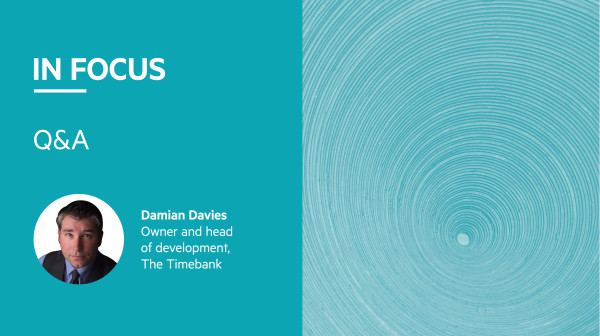

The founder of The Timebank says paraplanning is a "brilliant career" in its own right, as well as a good stepping stone for a future career in financial advice.
He tells FTAdviser In Focus why the beauty of the role is its variety, and why any efforts to standardise the role would be a mistake.
FTA: Paraplanners seem to be in high demand these days, is there a shortage of people?
DD: It’s an interesting position. Everyone wants paraplanners and firms often say they can’t find a good paraplanner to join their team, so something is askew.
I am not convinced there is a shortage, to be honest. I think that perception has arisen due to timing.
Paraplanning is a specialist role in a small profession, which is part of an industry that makes up a tiny percentage of the country’s population.
Firms look for paraplanners when they need them. That in itself really limits the available field to any paraplanner that might happen to be looking for a job at that same moment in time.
The fact that they can’t find a paraplanner doesn’t mean there is a shortage.
FTA: Is there such a thing as a professional paraplanner or is it just a stepping stone towards a career in advice?
DD: As a stepping stone, the paraplanning role can definitely help people who want to gain experience and get qualified and move into advice.
It is a natural environment for learning. Also, in my experience the best ops people come from a paraplanning background, as it is a role that touches every part of an advice business.
At the same time, it is a brilliant career in its own right as it rewards in ways that roles like advice just cannot match.
The beauty of the paraplanning role is just this variety. There was a movement a little while ago to try to standardise the role of the paraplanner, and I think that’s a mistake.
FTA: Why is paraplanning a viable career in itself?
DD: Paraplanning isn’t just a viable career, it’s a brilliant career.
It is such a varied role, you can follow whichever path suits you best. Whether that be specialist or generalist, working in an office or at home, a hardcore technician or an organised driver of business. Paraplanning does not have a rigid definition, thankfully, so you can build your own career.
Paraplanning sits as the hub of the business. There isn’t an area that a paraplanner will not be involved in, which means there is a very rich opportunity to grow and develop as part of the future of the business as a whole.
It suits those people who are able to both look at the details of the case in front of them while also keeping an eye on the other bigger picture of cases that are in orbit. In my experience, diary management is a massively undervalued skill in this profession.
Paraplanners often work with more than one adviser. This can be an overlooked benefit, as you start to see different ways to get to a similar outcome, broadening your horizons and perceptions of what is possible.
Ultimately, paraplanning is a career where you know you are making a difference to people’s lives, you work as a team all with the prospect of good earnings too.
FTA: Is there anything that needs to change to entice more young people into paraplanning as a profession?
DD: I was asked to present to a room of finance undergraduates at Coventry University about what paraplanning is as a career and why I would recommend it.
It’s only when you get asked to do things like that you get the chance to take a step back and look at things with a fresh perspective and realise that it is a very niche way to earn a living.
As with anything, we need to make a noise if we want to be heard.
FTA: How has the role of the paraplanner changed in recent years?
DD: The role hasn’t changed, as such, but awareness of the role and perception of its contribution to a business has.
I’ve been doing this a really long time. Back in 2002 when I started The Timebank I was having to explain what paraplanning was and then try to explain why people should outsource it.
Today, advisers are more accepting of the value a paraplanner adds to the relationship when they act as critical friend. This is certainly a reflection of the fact the ideal paraplanner-adviser relationship is one based on good communication and managing expectations.
One thing that does need to change is the way paraplanning is managed. Too often I see paraplanners or paraplanning departments where the business owners know what paraplanning costs but have no idea of its value to the business, its contribution to the business’ profitability or even have any targets.
FTA: Are paraplanners the secret to success of a profitable advice business?
DD: Not necessarily. I don’t doubt that a financial advice business could be perfectly profitable without paraplanners. That is likely, however, to be the exception rather than the rule.
At the same time, I have seen businesses with paraplanning departments that might well be profitable, but they have no idea how the paraplanning function might contribute to that. Profitability has been luck, rather than judgement.
Logic says that paraplanners should be a key contributor to the profitability of an advice business. After all, the idea of a paraplanner is to give an adviser more time to spend with clients.
It’s what clients want, too. The thing clients value most about the relationship with the adviser is face time.
carmen.reichman@ft.com



